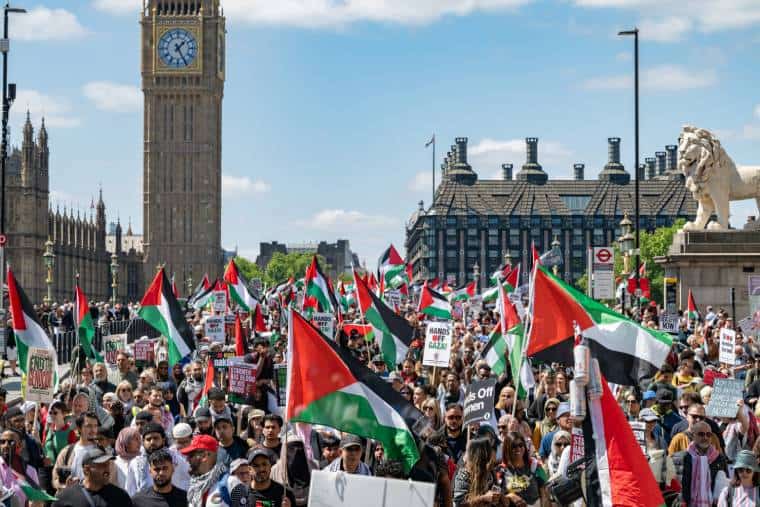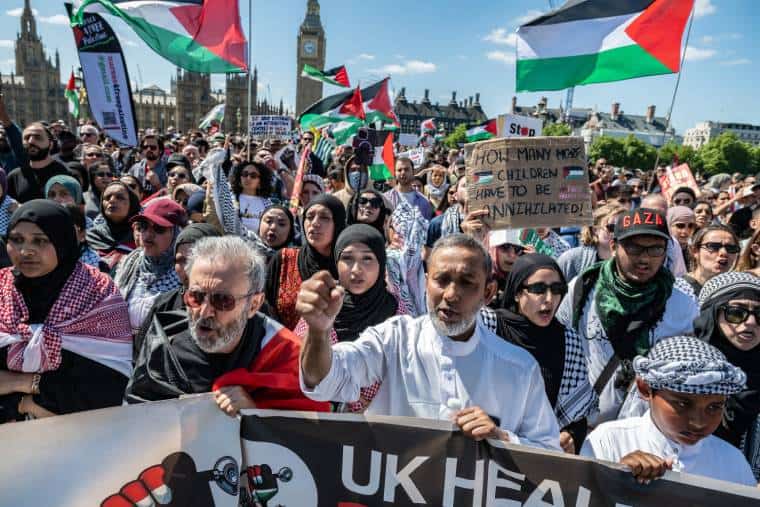Around one in eight people were on their first national demonstration for Palestine
By Socialist Worker journalists
Downloading PDF. Please wait…
Saturday 17 May 2025
A sea of solidarity on the Palestine march in London (Picture: Guy Smallman)
The size, vibrancy and political strength of the Palestine movement was on show on Saturday as over 500,000 people flooded the streets of central London.
It was the 27th national demonstration since Israel began its genocide in October 2023—and one of the biggest. As the front of the march reached Downing Street, it stretched back across Waterloo Bridge and onto Westminster Bridge.
Marchers have raged against Israel’s genocide for 19 months, but the Palestine movement continues to mobilise fresh forces.
Socialist Worker’s mass survey showed that one in eight demonstrators were on their first national demonstration.
First time marcher Doaa told Socialist Worker, “They’re trying to silence us, but they can’t take away our voices as well as here.
“Yemen, where I’m from, is one of the only countries standing up and turning ships around. It is going through one of the worst humanitarian crises in the world, and people are still trying to do something.
“All the countries should do the same as they are doing.”
Marchers raged on the 77th anniversary of the Nakba, when Zionist forces ethnically cleansed over 800,000 Palestinians to found the state of Israel.
Aleksandra, who came from Loughborough, told Socialist Worker, “This is my second London demonstration. We have vigils in Loughborough, but we need to see numbers out for the anniversary of the Nakba.”
Another marcher, Jamilla, told Socialist Worker. “It’s so important that people know this didn’t start on 7 October.
“Marches do make a difference. It’s very empowering to see so many people of different backgrounds marching together.”
“I grew up in Palestine,” Isabelle told Socialist Worker. “My father worked in Gaza, we lived in the West Bank.
“I have lost to people I was at school with, people murdered by the Israeli Occupation Force. I brought my kids because we have to show that when something is wrong, you have to stand up to it and make your voice count.”
Holocaust survivor Stephen Kapos told Socialist Worker the government’s “only response is to slander and abuse these marches—but they aren’t succeeding”.
The British state has tried to repress the Palestine movement. It is dragging leading figures from the Palestine Solidarity Campaign and Stop The War through the courts and police interviews.
And it is smearing the movement as a threat to Jewish people and Jewish places of worship.
Holocaust survivor Stephen Kapos told Socialist Worker, “They realise that the population is overwhelming against what is going on in Gaza.
“Their only response is to slander and abuse these marches—but they aren’t succeeding.”
His son Peter added, “It is a lie that these marches are no-go areas for Jews—we are always warmly welcomed.”
Hatred of Keir Starmer ran through the demonstration. “It’s disgusting,” Iqbal told Socialist Worker. “Starmer’s a human rights lawyer. Tell me, where’s the humanity in blowing people up?
“There’s no food, no water. There are no universities, no schools, no hospitals left. He’s pulling the whole West into supporting this horrific genocide. It’s unforgivable.”
He added, “Everyone says it’s wrong apart from Western parliaments. The media sides with Israel, but some people tell the truth.
“The petitions, the demos, the posters—we are doing the job that must be done.”
Protester Rosie from Hull agreed, “I think the Western media has been appalling throughout.”
Palestinian ‘freedom struggle will win’: interview with author Phil Marfleet
Julia from Barking in east London, told Socialist Worker, “Labour is saying things that belong in the mouths of Reform UK. To see Starmer and Labour politicians say that is disgusting and won’t be tolerated—we will stop it.”
Banners from several unions formed a bloc on the march. Gary is from the Coventry and Northamptonshire branch of the CWU union. He told Socialist Worker, “I’m proud as a postal worker to show solidarity with those Israel is murdering.
“Trade unions should be on side of oppressed—and I can think of no better example of modern oppression than the horrific genocide in Gaza.
“Every trade unionist worth their salt should be on this march.”
NEU education union rep Sheeran told Socialist Worker, “Israel will not stop until Gaza has been erased—it is a war of extermination.
“The government isn’t listening to us, but we are going to use all our power to demand a boycott and an arms embargo.”
Ewan, an NEU member who’s part of the Disarm Education campaign group, argued union leaders have to mobilise more over Palestine. “You need to separate trade union leadership from rank and file membership,” he told Socialist Worker.
“We have seen trade union leaders make public statements, but that needs to translate into action.”
“Block parliament, block something, shut something down—There must be an escalation of some kind.”
Iqbal
The size of the national demonstration shows the depth and breadth of the Palestine solidarity movement.
But after 19 months, many marchers are looking for ways to escalate action to break Britain’s links with Israel.
Protester Yala told Socialist Worker, “I really admire when people target the companies that manufacture weapons for Israel. We have to be more disruptive.”
Iqbal argued there needed to be “more big demos”, but said the movement had to go further. “Block parliament, block something, shut something down,” he said. “There must be an escalation of some kind.”
Another protester, Shama, argued for a renewed push for boycott, divestment and sanctions (BDS). “I believe we need more radical action, But every little bit counts,” he told Socialist Worker.
“If protesting didn’t do anything, they wouldn’t be trying so hard to suppress our protests so hard.”
He added, “Right now trans+ rights are under attack and I believe that’s also something we have to band together for. People use queer rights as an excuse to be anti-Palestine—it shows their ignorance.”
South London student Ravia said the issue was “cohesion”. “There’s so many different groups that are working towards this change but it’s quite fragmented,” she told Socialist Worker.
Ravia said “strikes and trying to disrupt the economy” could “make governments change their position. “Fundamentally, we have to make their support unprofitable,” she argued.
As hundreds of thousands filled Whitehall, left wing MP Apsana Begum spoke to the rally. She said, “Starvation is being deployed as a weapon of war. 2.3 million Palestinians are being denied food and medical aid and strikes are raining down on schools and hospitals.
“Everything our government has done, and everything it has failed to do will haunt its legacy.”
It was one of the biggest of the national demonstrations for Palestine (Picture: Guy Smallman)
Historian William Dalrymple said, “For 77 years, Palestinians have been terrorised into leaving their homes and farms. They have been driven from the valleys of the orange groves into the deserts of sand dunes.
“More weapons have left Britain for Israel under Keir Starmer’s government than under the Tories.
“But in the darkest night you dream the best. And our dreams are not just fantasies. We will unite against the racists and bigots in parliament until the enslavement of Palestine is ended.
“The night will not last forever—one day the sun will rise. There will be peace, freedom and dignity. We dream of a free Palestine.”
Israel is ramping up its genocide and looking to extend its occupation.
The genocide is Gaza is driving a crisis of legitimacy for the West’s rulers—and that is opening up divisions for the movement to exploit.
Western imperialism has destroyed Afghanistan, Iraq, Libya and other countries under the guise of “humanitarian intervention”. At the same time, it has held up Israel as a “civilised society” and the “one democracy” in the Middle East.
But now our rulers’ watchdog state stands exposed as a racist, genocidal project in the eyes of millions who had not marched before.
The Financial Times, the house journal of Britain’s ruling class, wrote a damning editorial last week in a sign of the divisions at the top of society.
It said, “The US and European countries that tout Israel as an ally that shares their values have issued barely a word of condemnation. They should be ashamed of their silence, and stop enabling Netanyahu to act with impunity.
“The longer it goes on, the more those who remain silent or cowed from speaking out will be complicit.”
The editorial writers of the FT hope that, through the mildest condemnations of genocide, Western states can regain their “legitimacy”.
But the division it shows up are an opportunity—the Palestine movement can exploit them to demand the British state severs its ties with Israel.
That will take building the movement and linking it to the wider rage at Starmer’s onslaught under the slogan “welfare not warfare”. And we have to build mass action to stop the flow of arms that murder Palestinians.
How many demonstrations have people been on?
Socialist Worker carried out a mass survey asking people how many national demonstrations they have been on:
- First demonstration: 13 percent
- Between 2-5 demonstrations: 40 percent
- Between 6-10 demonstrations: 13 percent
- Between 11-15 demonstrations: 6 percent
- Between 16-20 demonstrations: 2 percent
- Between 21-26 demonstrations: 14 percent
- All demonstrations: 12 percent


